This article was medically reviewed by Gary Hoffman, MD. Dr. Gary Hoffman is a board certified Colorectal Surgeon and the Clinical Chief of the Division of Colon and Rectal Surgery at Cedars Sinai Medical Center. With over 35 years of experience, Dr. Hoffman has helped to advance laparoscopic and robotic surgery for the treatment of colon and rectal cancer. Dr. Hoffman holds a BS from the University of California, Irvine, and a Doctor of Medicine (MD) from Vanderbilt University. He completed his surgical internship at Los Angeles County-USC Medical Center and his surgical residency at Louisiana State University-Charity Hospital of New Orleans Medical Center. Dr. Hoffman is an Attending Surgeon in the Division of General Surgery and Colon and Rectal Surgery at Cedars Sinai Medical Center. He is also an Associate Clinical Professor of Surgery at The David Geffen School of Medicine, University of California, Los Angeles. Dr. Hoffman is a member of The American Society of Colon and Rectal Surgeons, The Southern California Society of Colon and Rectal Surgeons, The American College of Surgeons, and The American Medical Association.
There are 16 references cited in this article, which can be found at the bottom of the page.
wikiHow marks an article as reader-approved once it receives enough positive feedback. In this case, 100% of readers who voted found the article helpful, earning it our reader-approved status.
This article has been viewed 68,156 times.
Colon polyps are little nodules that are found along the lining of the large intestine. These little mushroom-shaped growths can be very small but also grow to the size of a golf ball as well. Some types of polyps, especially the smaller ones, are benign. However, other types and the ones that have gotten much larger may turn into colon cancer.[1] Although colon polyps can be removed (as during a colonoscopy), it's also important to make sure that you alter your diet to help prevent polyps from forming in the first place.
Steps
Adding Nutrient Dense Foods to Prevent Polyps
-
1Focus on red, yellow and orange vegetables. Vegetables are an important food group to prevent a variety of diseases and cancers. However, red, yellow and orange vegetables have high levels of vitamins and antioxidants that can help keep your colon healthy.[2]
- What makes these vegetables that particular color are the vitamins and antioxidants that are found in them. Red, yellow and orange vegetables are particularly high in an antioxidant known as beta carotene which is an orange/red color.
- This antioxidant is often associated with Vitamin A as it is a precursor to becoming Vitamin A in your body. Adequate intakes are also associated with a decreased rate of colon cancer.
- Include a one cup serving of any of these colored vegetables. You can try: red, yellow and orange bell peppers, sweet potatoes, pumpkin, butternut squash and carrots.
-
2Include folate-rich foods. Another group of foods that can help protect your colon and resist the formation of polyps are folate-rich foods. Luckily, folate can be found in a wide variety of foods.
- Studies have shown that an intake of 400 IU of folate every day can help prevent the formation of polyps but also helps prevent colon cancer as well.[3]
- 400 IU of folate is easily consumed if you eat a balanced diet and focus on folate-rich foods.
- Specific foods that are high in folate include: fortified breakfast cereals, spinach, black-eyed peas, asparagus, broccoli, green peas, whole wheat bread and peanuts.
Advertisement -
3Consume calcium-rich foods. Calcium is another commonly found mineral that has been shown to prevent the formation of colon polyps. Including regular servings of foods high in calcium can help protect your colon.
- One study in particular showed that those people who consumed 1200 mg of calcium daily (which you can get from three servings of calcium-rich foods), had a 20% less recurrence of cancerous colon polyps.[4]
- Calcium is found most commonly in dairy foods. You can have milk, yogurt, kefir, cheese or cottage cheese to get in an adequate serving of calcium.
- In addition, calcium is found in other plant-based foods outside of the dairy group. Almonds, broccoli, dark greens, and fortified orange juice or soy milk offer another source of calcium.
-
4Focus on healthy fats. Some foods contain a certain type of fat called omega-3 fats. Often known as heart healthy fats, these fats are also beneficial to your colon. [5]
- Studies have shown that omega-3 fats help maintain and even improve cell health in the colon. Include regular servings of healthy fats to help prevent colon polyps.
- Healthy fats are found in a wide variety of foods. Include a serving of these foods daily to help protect your colon and prevent the formation of polyps.
- Include foods like: avocado, olive oil, olives, salmon, tuna, sardines, mackerel, walnuts and flaxseeds.
-
5Drink green tea. Many studies have shown the benefits of green tea in preventing polyps and colon cancer.[6] Try swapping out your morning coffee for a cup of green tea or drink a cup or two of decaffeinated green tea after dinner.
-
6Drink more water. Although water is not a specific food or a nutrient, it's essential to overall health. Specifically, studies have shown that a lack of adequate water can lead to dehydration and polyp formation in your colon.[7]
- When you don't drink adequate amounts of fluids, your body will harvest free water from other areas - like your stool or other cells. This causes dehydration and constipation.
- Decreased bowel transit time and the concentration of carcinogenic compounds that are found in cells can increase your risk for the growth of cancerous polyps.
- Health professionals recommend drinking about 64 oz or 8 glasses of water everyday. However, you may need to increase your water intake to prevent constipation.[8]
Following a High Fiber Diet
-
1Eat an adequate amount of vegetables daily. Vegetables are high in a variety of nutrients that can keep your body healthy. However, they're also high in fiber which can help protect your colon.
- Fiber is essential to keeping your bowels moving at a healthy speed. When your bowel transit is slow, you increase your risk for colon polyps and cancer.[9]
- To meet your recommended fiber intake, include three to five servings of vegetables everyday. Measure out one cup of vegetables or two cups of salad greens.[10]
- Vegetables that are particularly high in fiber include: artichokes, asparagus, avocado, sweet potatoes, bean sprouts, dark greens, beets, broccoli, cauliflower and cabbage.
-
2Include enough servings of fruit. Fruits are also high in a variety of nutrients. Some fruits are also exceptionally high in fiber which can help you increase your overall fiber intake.
- Include one to two servings of fruits everyday. Measure out the appropriate portion. You can choose one small piece of fruit or measure out 1/2 cup of of chopped fruit.[11]
- Fruit that is particularly high in fiber include: apples, apricots, berries, bananas, cantaloupe, oranges and coconut.
-
3Go for 100% whole grains. One specific group of foods that are also known for being very high in fiber are grains. However, choose 100% whole grains over the refined grains for the most nutrient dense choice.
- Whenever you choose to eat grains (like bread, rice or pasta), go for 100% whole grains. These foods are less processed and much higher in fiber compared to refined grains (like white rice or white bread).
- Include two to three servings of whole grains every day. Measure these out to 1/2 cup of cooked grains or 2 oz per serving.[12]
- Choose foods like: brown rice, quinoa, oatmeal, whole wheat bread, whole grain pasta, millet, farro or barley.
-
4Choose high fiber protein sources. You might not think that many protein foods are high in fiber. But vegetarian sources of protein do offer a decent amount of fiber per serving.
- Legumes are not only high in protein, but are also very high in fiber. These are a great food group to add to your diet to help increase your overall fiber intake.
- Legumes are a plant-based group that include foods like beans, lentils and nuts.
- Since they do fall into the protein group, they follow the recommendations for those serving sizes. Measure out 1/2 cup of these foods per serving.[13]
- Choose foods like: black beans, chickpeas, lentils, peanuts, soy beans, lima beans, kidney beans and pinto beans.
-
5Choose foods fortified with extra fiber. Since fiber plays such an important role in general health, many food manufacturers have been adding fiber to their products. This is a great way to help people meet their daily needs.
- Fiber is found in a wide variety of foods, but it can still be difficult to meet your daily needs. Men need 38 g of fiber daily while women need about 25 g of fiber daily.[14]
- In addition to choosing foods and food groups that are high in fiber, also look for foods that have added fiber to them. This fiber is added during the processing of the food and can help you meet your needs.
- Foods that are commonly fortified with extra fiber include: yogurt, soy milk, cereals, breads, orange juice and granola bars.
Avoiding Foods that can Harm Your Colon
-
1Limit your intake of saturated fats. Although there are many foods that you should eat more often to help prevent colon polyps, there are foods that you should limit or avoid.
- Saturated fats, unlike omega-3 fats, have been shown to increase your risk for the formation of colon polyps and colon cancer.[15]
- One study in particular found that for every additional 100 grams of red meat that you consume (which is higher in saturated fat) your risk for colon cancer increases by 14%.
- Limit meats: fatty cuts of beef, salami, hot dogs, bacon, sausage and deli meat. These are highly processed and high in saturated fat.
- If you do choose to have these foods occasionally, stick to the appropriate portion of 3 to 4 oz total per serving.[16]
-
2Decrease your sugar consumption. You may not realize that another group of foods that has been linked to colon polyps and colon cancer are sugary, sweetened foods. Limit these in your diet.
- The sugar from sweetened foods increase your glucose levels. Studies have shown that with increased glucose levels, your risk for the formation of colon cancer increases as well.[17]
- Foods that are high in sugar and that should be limited include: sweetened beverages, candy, cookies, cakes, pies, ice cream, sugary cereals, pastries and fruit juices.
- If you do choose to have these foods, make sure they are small portions and something you only eat occasionally - not on a regular basis.
-
3Try to avoid burned, charred, or fried meats. In addition to avoiding or limiting certain foods, you should also take care of how you prepare certain foods. Charring or burning foods when you cook them may increase your risk of colon cancer.[18]
- When you cook foods, especially over a grill, you can char or burn them. Although this may taste good, this charring creates carcinogenic substances in the food which have been associated with higher rates of colon cancer.
- If you are grilling foods try to avoid foods from becoming overly charred. When eating, avoid the blackened bits or areas that are charred. Remove with a fork and knife so they are completely removed from your serving.
- Another trick is to grill or cook foods over aluminum foil. This helps prevent foods from becoming too charred or burned.
-
4Limit your intake of alcohol. In addition to sweetened beverages, alcoholic beverages have also been linked to the formation of colon polyps. You should limit your overall intake of alcoholic beverages.
- Studies have shown that regular consumption of alcohol (more than the recommended limit of one to two glasses daily) is associated with increased risk of colon polyp formation.
- In addition, those people who have had a history of colon polyps are at an increased risk for those polyps becoming cancerous with more excessive intake of alcoholic beverages.
- Try to limit how much alcohol you consume. Women shouldn't consume more than one drink daily and men should limit their intake to two drinks or less per day.
Expert Q&A
Did you know you can get expert answers for this article?
Unlock expert answers by supporting wikiHow
-
QuestionAre there any dietary changes you can make to help prevent colon polyps?
 Gary Hoffman, MDDr. Gary Hoffman is a board certified Colorectal Surgeon and the Clinical Chief of the Division of Colon and Rectal Surgery at Cedars Sinai Medical Center. With over 35 years of experience, Dr. Hoffman has helped to advance laparoscopic and robotic surgery for the treatment of colon and rectal cancer. Dr. Hoffman holds a BS from the University of California, Irvine, and a Doctor of Medicine (MD) from Vanderbilt University. He completed his surgical internship at Los Angeles County-USC Medical Center and his surgical residency at Louisiana State University-Charity Hospital of New Orleans Medical Center. Dr. Hoffman is an Attending Surgeon in the Division of General Surgery and Colon and Rectal Surgery at Cedars Sinai Medical Center. He is also an Associate Clinical Professor of Surgery at The David Geffen School of Medicine, University of California, Los Angeles. Dr. Hoffman is a member of The American Society of Colon and Rectal Surgeons, The Southern California Society of Colon and Rectal Surgeons, The American College of Surgeons, and The American Medical Association.
Gary Hoffman, MDDr. Gary Hoffman is a board certified Colorectal Surgeon and the Clinical Chief of the Division of Colon and Rectal Surgery at Cedars Sinai Medical Center. With over 35 years of experience, Dr. Hoffman has helped to advance laparoscopic and robotic surgery for the treatment of colon and rectal cancer. Dr. Hoffman holds a BS from the University of California, Irvine, and a Doctor of Medicine (MD) from Vanderbilt University. He completed his surgical internship at Los Angeles County-USC Medical Center and his surgical residency at Louisiana State University-Charity Hospital of New Orleans Medical Center. Dr. Hoffman is an Attending Surgeon in the Division of General Surgery and Colon and Rectal Surgery at Cedars Sinai Medical Center. He is also an Associate Clinical Professor of Surgery at The David Geffen School of Medicine, University of California, Los Angeles. Dr. Hoffman is a member of The American Society of Colon and Rectal Surgeons, The Southern California Society of Colon and Rectal Surgeons, The American College of Surgeons, and The American Medical Association.
Colorectal Surgeon
wikiHow Video: How to Alter Your Diet to Avoid Colon Polyps
References
- ↑ http://gicare.com/diseases/prevention-of-colon-polyps-and-cancer/
- ↑ http://www.everydayhealth.com/hs/colon-cancer-awareness/pictures/colon-cancer-prevention-diet/#05
- ↑ http://gicare.com/diseases/prevention-of-colon-polyps-and-cancer/
- ↑ http://www.cancer.gov/about-cancer/causes-prevention/risk/diet/calcium-fact-sheet
- ↑ http://www.everydayhealth.com/hs/colon-cancer-awareness/pictures/colon-cancer-prevention-diet/#03
- ↑ https://www.verywell.com/can-green-tea-prevent-colon-cancer-797479
- ↑ http://jco.ascopubs.org/content/22/2/383.1.full
- ↑ http://www.mayoclinic.org/healthy-lifestyle/nutrition-and-healthy-eating/in-depth/water/art-20044256
- ↑ http://gicare.com/diseases/prevention-of-colon-polyps-and-cancer/
- ↑ http://www.choosemyplate.gov/vegetables
- ↑ http://www.choosemyplate.gov/fruit
- ↑ http://www.choosemyplate.gov/grains
- ↑ http://www.choosemyplate.gov/protein-foods
- ↑ http://www.mayoclinic.org/healthy-lifestyle/nutrition-and-healthy-eating/in-depth/fiber/art-20043983?pg=2
- ↑ http://www.everydayhealth.com/hs/colon-cancer-awareness/pictures/colon-cancer-prevention-diet/#02
- ↑ http://www.choosemyplate.gov/protein-foods
- ↑ http://cebp.aacrjournals.org/content/6/9/677.short
- ↑ http://www.everydayhealth.com/hs/colon-cancer-awareness/pictures/colon-cancer-prevention-diet/#09
About This Article
Eating a variety of nutrient-rich foods is a good way to reduce your risk of colon polyps. Go for red, yellow, and orange vegetables, which are rich in vitamin A and antioxidants. Foods that contain folate, like spinach, peas, and asparagus, are also important for preventing polyps. In addition to vegetables, choose foods that are high in calcium, like milk and fortified juices, and healthy sources of fat, such as fish, avocado, nuts, and vegetable oil. Prevent constipation, which can increase your risk of polyps, by eating plenty of fiber-rich vegetables and whole grains. Staying hydrated also improves your bowel health, so drink lots of water and antioxidant-rich beverages, like green tea. Read on for more expert tips, like how to avoid foods that can damage your colon.
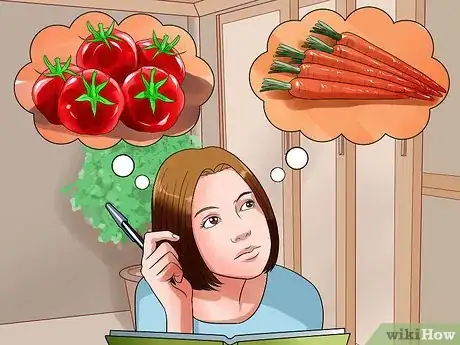
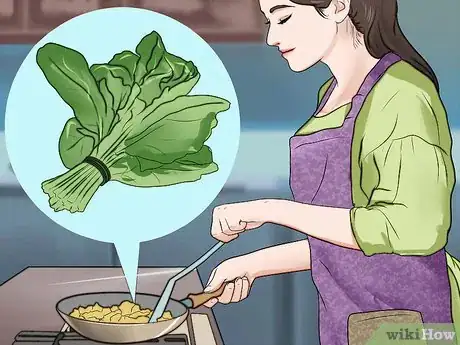


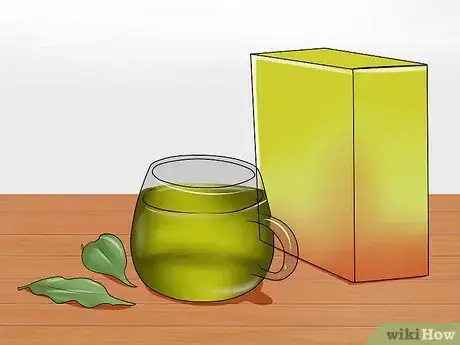




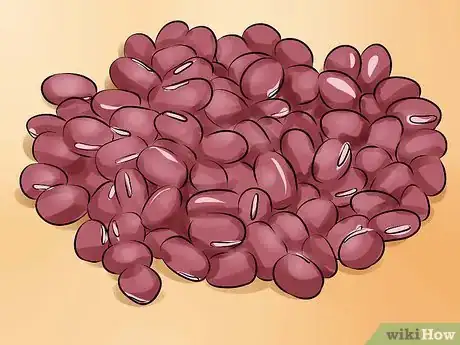

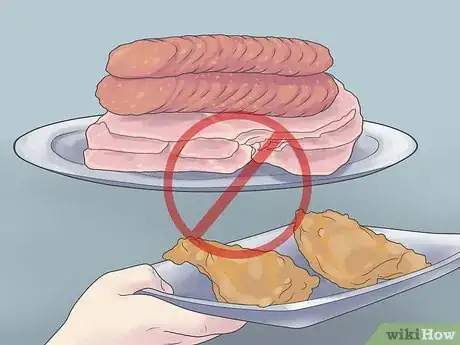
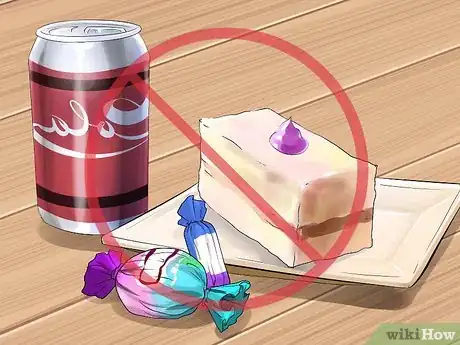




















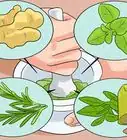



































Medical Disclaimer
The content of this article is not intended to be a substitute for professional medical advice, examination, diagnosis, or treatment. You should always contact your doctor or other qualified healthcare professional before starting, changing, or stopping any kind of health treatment.
Read More...